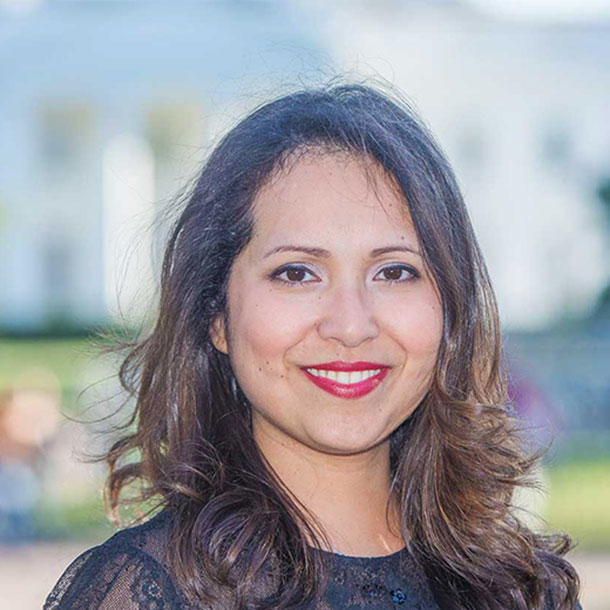Years at DCEG: 2015-2017
DCEG Title: Postdoctoral Research Fellow
Current Organization: Friends of Cancer Research
Current Title: Science Policy Analyst
Who was your mentor at DCEG? What did you work on?
My primary mentor was Lindsay Morton, Ph.D., from the Radiation Epidemiology Branch and my secondary mentor was Sharon Savage, M.D., from the Clinical Genetics Branch.
I came to DCEG with an interest in using my background in genetics/genomics to understand more about risk of second cancers in cancer survivors. The bulk of my research explored genetic susceptibility to subsequent malignancies in survivors of childhood cancer who were exposed to ionizing radiation. We used the wealth of genetic and clinical data collected as part of the Childhood Cancer Survivor Study (CCSS) to better understand the association between genetic variants and subsequent cancer risk in a well-characterized population of childhood cancer survivors. As part of this project, we identified variants associated with the DNA damage repair pathway that may be associated with elevated cancer risk in this population.
At DCEG, I got to learn more about classic epidemiology approaches to characterizing risk of cancer using large cancer registries like SEER and worked on a project that investigated risk of second sarcomas in survivors of adolescent & young adult (AYA) cancers.
I also had the privilege to work on identifying genetic modifiers of risk to multiple cancers in individuals who were diagnosed with familial cancer syndromes, such as Li-Fraumeni Syndrome.
What is your current position?
My current position is Science Policy Analyst at Friends of Cancer Research; however, the job title doesn’t really tell you much about what I do! I work on the development of evidence-based policies that will improve care for cancer patients and survivors. Friends of Cancer Research focuses on identifying barriers to proper healthcare and convening a robust group of stakeholders to identify practical solutions and recommendations to overcome those barriers, and we seek to implement them by advocating for policy change and legislative action. We advocate for what’s best for the patient in everything we do.
I interact with different stakeholders for the various projects that I lead, which include members of academia, industry, patient advocacy organizations and the U.S. Food and Drug Administration (FDA), and I seek to facilitate dialogue while managing the development of scientific partnerships among the different groups.
How do you apply the skills you developed at DCEG in your current job?
Thanks to DCEG, I was able to develop various professional and personal skills that I use in my current job. I learned to be meticulous while working with large databases and registries, as well as the power of persisting at a task until its completion. This is a great asset in my work with many different stakeholders and the various timelines I have to manage. Another skill that I was able to perfect through multidisciplinary work at DCEG was the art of seeing issues from different points of view. It was so enriching to attend meetings where I could listen to many different perspectives on a single issue from dosimetrists, epidemiologists, clinicians, geneticists, clinical genetic counselors, engineers, laboratory scientists, etc. In turn, this has been very helpful in large projects with several stakeholders—really listening to their concerns, understanding where they are coming from and seeing things from their point of view is a wonderful skill to have.
Do you have any memories from your fellowship that you would like to share?
I had such a wonderful time while at DCEG. I met amazing colleagues and mentors who I will cherish for a lifetime. One of the great memories I made while in the Division was my time volunteering for the Take Your Child to Work Day! I had so much fun creating a kid-friendly poster and leading an activity on sun (radiation) exposure to teach the kids what sunscreen does and why it is important. I have such great memories of many lunch conversations with colleagues, Christmas cookie exchange parties, Division-wide social teas, St. Patrick's Day Celebrations, apple-picking adventures, camping trips, Halloween shenanigans, and patio BBQ parties with my fellows. The people at DCEG are so remarkable and they made me feel right at home!
What do you do in your free time?
Wow, free time… I don’t think there is such a thing as free time, but I choose to make time to go on long walks by a body of water (lake, river, etc.), master the art of a great charcuterie board and share it with friends, or have a low-key evening at home watching a movie and eating lots of popcorn! I love learning/trying something new all the time, so I see “free time” as an opportunity for adventure!
Do you have any advice for current or future DCEG fellows?
Make the most of your time at DCEG. There are so many resources available at your fingertips, from attending seminars in a different field to volunteering to clean up a park in Annapolis. All of these can become little treasures in your heart and mind that help you discover who you are and where you should go.
Say yes to that Branch Tea Party, to the 5K run, or to rock-climbing with fellows—you will cherish these experiences for a lifetime. Say yes to the opportunity to sit down with Jackie Lavigne, Ph.D., M.P.H., and review your strengths from the StrengthsFinder test—I truly recommend taking the test! Say yes to research collaborations—they may launch your career forward and expand your horizons. Life is more about making connections than writing papers (although papers are very useful and necessary), and at DCEG you will have great connections to make, wonderful opportunities to seize, and amazing memories to treasure for the rest of your life!
